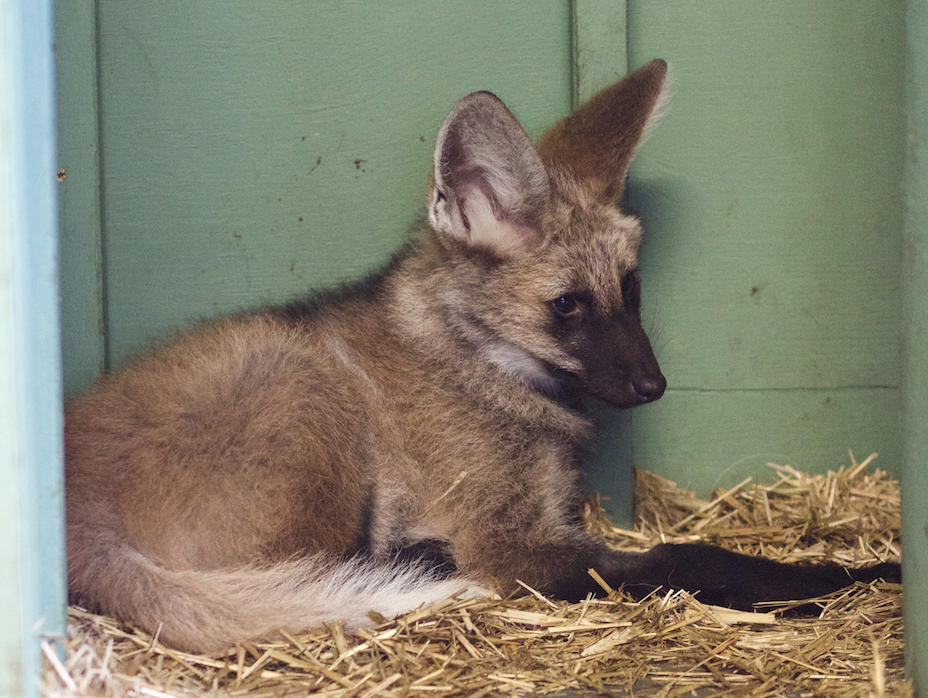
BRIDGEPORT, Conn. – Connecticut’s Beardsley Zoo is pleased to announce the results of its “Name the Maned Wolf Pups” poll, taken on Facebook and giving respondents a choice between two names for each of the three pups. Animal care staff chose the prospective names, all South American names or terms to honor the native habitat of the Zoo’s maned wolves. Female maned wolf Bonita and male maned wolf Paulo are the proud parents of two girls and a boy, born December 27, 2018.
The winning names are Goncalo for the male, and Guapa and Sabana for the girls. Until the winning names were chosen, animal care staff members were keeping track of the pups by small shaved areas on their legs, administered after their first veterinary exam. The weeklong contest engaged hundreds of voters on Facebook.
Goncalo won 58% of the vote, and means “one who is brave in battle.”
Guapa won 67% of the vote, and means, “beautiful,” like her mother, Bonita.
Sabana won 80% of the vote, and means “open plains,” the native habitat of maned wolves.
Today, there are about 4,000 maned wolves in the wild. This number is dwindling due to their severely compromised habitat being destroyed by farmers through intense deforestation. In addition, they are threatened by road kill, persecution by humans, and disease due to contact with domestic animals. There is also a belief that certain of their organs have magical healing powers. Because of this, the birth of the Zoo’s three pups represents a welcome increase in the overall scarce population.
The development of a Species Survival Plan (SSP) has enabled the breeding of maned wolves in captivity. The SSP program pairs genetically significant individuals to produce offspring with the greatest genetic variation. The goals of the Maned Wolf SSP (MWSSP) are to maintain a viable, self-sustaining captive population in North America, enhance the health and wellbeing of individuals living in North American zoos, and promote conservation of this species through education and field conservation initiatives.
About Maned wolves
The maned wolf is not really a wolf, but neither is it a fox. It is a canid, and is the only species in the genus Chrysocyon,meaning “golden dog.” Described as looking like a fox on stilts, these shy mammals are native to South America, and dislike cold weather. For that reason, they have access to a heated enclosure year round. Part of the Zoo’s Pampas Plains exhibits, they inhabit lowland grasslands and scrublands of Brazil, Paraguay, Argentina, Bolivia, and Peru.
The pups are fully grown in a year, and live approximately 12-15 years in captivity. It is not known what their lifespan is in the wild. Maned wolves are monogamous, taking only one mate for their lifetime. The pair will share a territory in the wild, only coming into contact at mating season. Males will assist in the care of the young, regurgitating food for their pups. The maned wolf is omnivorous, and more than half of their diet is fruit/plant based. In Brazil, a common fruit they eat is Solanum lycocarpum, or lobeira, also known as “Fruit of the Wolf.” The fruit looks like a large tomato.
The maned wolf also eats cuis (wild guinea pigs), rabbits, and burrowing rodents. They also will eat insects, reptiles and birds, along with sugarcane. The maned wolves’ small teeth and jaws make it hard for it to eat larger prey such as farm animals, but it is hunted and killed by farmers who believe they are eating their livestock, because of their intimidating size. Both males and females are 4 to 4.5 feet in length, excluding its tail, and weigh between 44 and 50 pounds.
# # #
About Connecticut’s Beardsley Zoo
Spend the day a world away! Connecticut's only zoo, celebrating its 96thyear, features 300 animals representing primarily North and South American species. Guests won't want to miss our Amur tigers and tiger cubs, Amur leopards, maned wolf family, Brazilian ocelot, Mexican wolves, and Golden Lion tamarins. Other highlights include our South American rainforest with free-flight aviary, the prairie dog exhibit with "pop-up" viewing areas (and prairie dog pups born this spring), the New England Farmyard with goats, pigs, sheep, and other barnyard critters, plus the hoofstock trail featuring bison, pronghorn, deer, and more. Guests can grab a bite at the Peacock Café, eat in the Picnic Grove, and enjoy a ride on our colorful, indoor carousel. For more information, visit beardsleyzoo.org.